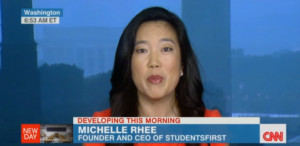Last week, a California judge struck down the state’s teacher tenure and seniority policies. Rolf M. Treu, Los Angeles County Superior Court Judge, declared the state’s laws governing job security unconstitutional “because they harmed predominantly low-income, minority students by allowing incompetent instructors to remain in the classroom.” Treu went on to say that the policy imposes “a real and appreciable impact on students’ fundamental right to equality of education…the evidence is compelling. Indeed, it shocks the conscience.”
Many outside the field of education may not be clear on what the policies of teacher tenure and teacher seniority entail. While specifics vary from state to state, generally speaking, teacher tenure is a policy in which a teacher is entitled to due process when they are threatened with dismissal. While this sounds good on the surface, the process “is exceedingly tedious for administrators,” taking years and costing hundreds of thousands of dollars in legal fees. For this reason, many consider tenure to be a “lifetime contract” for a teacher, one that is difficult if not impossible to sever once it has been established. As for the seniority policy, this generally states that teachers who have been in the district longer have seniority over teachers with less time in the district in regards to job security. For example, teacher A may have taught in the district for eleven years while teacher B has taught for eight years. If teacher A’s position is eliminated, she may “bump” teacher B and take his position, provided she has proper certification for said position. At that point, teacher B may “bump” someone with fewer years than he has, and so on. Only experience within the particular district is considered, meaning a teacher with fewer years of total experience may bump a teacher with higher years of experience who is newer to the particular district. This is commonly referred to as “last hired, first fired.”
Education has changed and education policy should change, too.
In states where tenure is offered, teachers must complete a probationary period prior to being given tenure. The District of Columbia has no set time period before which a teacher may be given tenure. In some states this period is as little as one year; in most (32 states), it is a three-year period. During that three years, a teacher may be fired for any reason, but after the three years, once tenure is granted, it is extremely difficult to remove a teacher, even if he/she is performing poorly. Tenure is often given to virtually any teacher who completes the probationary teaching period–in 2010 in New York, only 0.4 percent of those eligible were denied tenure. Some states do not offer tenure, including Iowa, the state where I currently teach. Instead, teachers sign yearly contracts, which are distributed in late spring for the next school year. At any time a district may decide not to offer a contract to a teacher, regardless of the number of years that teacher has taught.
Over the course of my teaching career I have taught in five different states, some of which were states with tenure policies. When I taught second grade in a suburb of Wichita, Kansas, I experienced the drawbacks of tenure firsthand. As probationary teacher, I was frequently told by tenured teachers not to speak up at staff meetings or district trainings. This, I was told, was too risky, as I could lose my job over something that I said. Just wait three years, I was told, and then you can say anything you want. I was not a fan of this tenure policy at all; it made probationary teachers feel as though we were not yet legitimate teachers with valuable insights, because we were never allowed to speak up and share our ideas. Conversely, it gave many tenured teachers a sense of entitlement to call all of the shots while non-tenured teachers had to “go along to get along”.
Kids deserve the best and brightest.
Some would argue tenure is necessary to prevent the firing of teachers for arbitrary reasons. In my experience in non-tenure states, including Iowa, I have not seen that to be the case. The only teachers I have seen removed from their positions are those who have violated moral/ethical clauses in their contracts, or who have had multiple years were their performance evaluations have shown that they are not adequately carrying out the duties of their position. Like Judge Treu in California, I believe tenure policy threatens students’ rights to a quality education. If a teacher is evaluated regularly and found to be carrying out the duties of their position, they should keep their job. If a teacher is not fulfilling their end of the contract, they should be at risk of losing their position. As a teacher, we are responsible for the children in our classroom–this is a sacred trust. As a parent, I do not want my child to have their chance at a quality education shortchanged because a district was afraid to fire an ineffective teacher. One expert who testified in the California case noted “a single year in a classroom with a bad teacher costs pupils $1.4 million in lifetime earnings per classroom”.
For those worrying that good teachers will be fired for no reason or that older teachers will be removed so that districts can save money with newer teachers and smaller salaries, this worry is unfounded. Employment laws have changed in the decades since tenure was first established, and teachers, like other workers, have greater legal rights when it comes to challenging termination of employment. Originally, tenure was established to prevent teacher firing for arbitrary reasons, such as age, gender or nationality. Today’s laws already protect people from being fired for such reasons, meaning we no longer need tenure as a safeguard. It is a system that has long since outlived its usefulness, and one which needs to go.




2 comments
Thanks Kevin. I strive to address issues in education where I feel that the media often portrays a view that differs from my own. Not all teachers think alike and I want opposing views to be heard.
Great post Bobbi!
I understand the need for tenure on the university level where professors are for the most part also researchers. On that level, tenure is a necessary component for academic freedom in order to allow controversial subjects to be researched and discussed.
However on the K-12 level, tenure is outdated and is just simply a mechanism whereby teacher's unions protect the jobs of those teachers who need to be doing something else. Ending tenure is a necessary component, along with merit pay, of improving the quality of instruction in our schools.